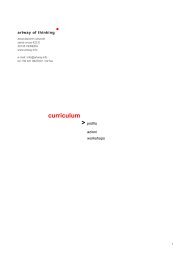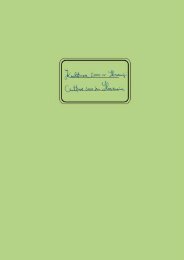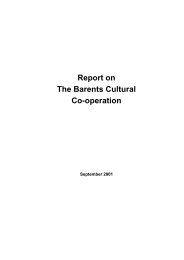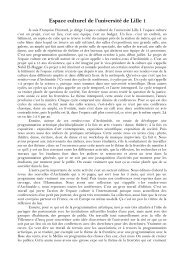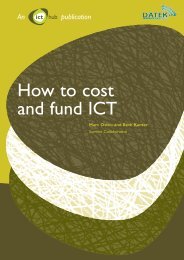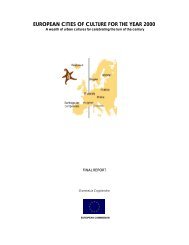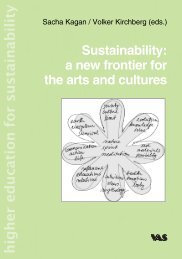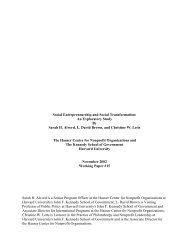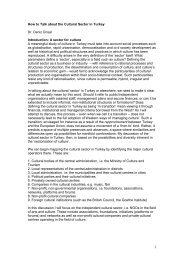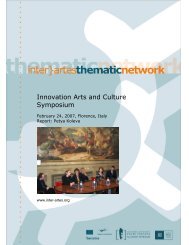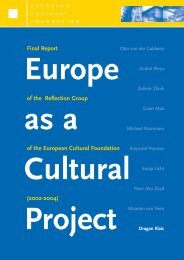A guide to the export and import of cultural goods between Russia ...
A guide to the export and import of cultural goods between Russia ...
A guide to the export and import of cultural goods between Russia ...
Create successful ePaper yourself
Turn your PDF publications into a flip-book with our unique Google optimized e-Paper software.
Chapter 2: The Movement <strong>of</strong> Cultural Goods from <strong>and</strong> <strong>to</strong><br />
<strong>the</strong> European Union: <strong>the</strong> Legal Framework<br />
condition <strong>to</strong> <strong>the</strong> Community. The licence may be used <strong>to</strong> cover any combination <strong>of</strong> <strong>goods</strong><br />
in <strong>the</strong> permanent collection at any one occasion <strong>of</strong> temporary <strong>export</strong>. It can be used <strong>to</strong><br />
cover a series <strong>of</strong> different combinations <strong>of</strong> <strong>goods</strong> ei<strong>the</strong>r consecutively or concurrently.<br />
Both specific <strong>and</strong> general open licences have each <strong>the</strong>ir own application form, models <strong>of</strong><br />
which are in Annexes <strong>to</strong> Commission Regulation 752/93.<br />
What o<strong>the</strong>r formalities should I know about?<br />
Although, in principle, both printed <strong>and</strong> electronic forms <strong>of</strong> licence applications are foreseen<br />
by Commission Regulation 752/93, <strong>the</strong> vast majority <strong>of</strong> Member States only accept<br />
printed versions.<br />
Since an <strong>export</strong> licence is valid throughout <strong>the</strong> Community, it can be presented for <strong>export</strong><br />
<strong>to</strong> <strong>the</strong> authorities <strong>of</strong> a Member State that is not <strong>the</strong> Member State which issued it. In<br />
such cases Commission Regulation 752/93 provides that <strong>the</strong> competent authorities <strong>of</strong> <strong>the</strong><br />
Member State in which <strong>the</strong> licence is presented may ask for it <strong>to</strong> be translated in<strong>to</strong> <strong>the</strong><br />
language, or one <strong>of</strong> <strong>the</strong> <strong>of</strong>ficial languages, <strong>of</strong> that Member State. In this case, <strong>the</strong> translation<br />
costs are met by <strong>the</strong> licence holder.<br />
What happens if a <strong>cultural</strong> object has been unlawfully removed from a Member State?<br />
Council Regulation 3911/92 establishes a preventive instrument <strong>to</strong> avoid illegal <strong>export</strong> <strong>of</strong><br />
<strong>cultural</strong> <strong>goods</strong> from <strong>the</strong> EU <strong>to</strong> third countries: <strong>the</strong> EU <strong>export</strong> licence. Illegal movements <strong>of</strong><br />
national treasures from one Member State <strong>to</strong> ano<strong>the</strong>r do, however, still occur (such as <strong>the</strong><br />
movement <strong>of</strong> <strong>goods</strong> banned from <strong>export</strong>, or without <strong>the</strong> necessary licence or permit).<br />
In order <strong>to</strong> facilitate <strong>the</strong> return <strong>of</strong> <strong>cultural</strong> <strong>goods</strong> unlawfully removed from <strong>the</strong> terri<strong>to</strong>ry <strong>of</strong> a<br />
Member State, Council Directive 93/7/EEC <strong>of</strong> 15 March was approved (Council Directive<br />
93/7/EEC). This legal text is a Directive; <strong>the</strong>refore Member States had <strong>to</strong> adopt legislation<br />
<strong>to</strong> comply with it by a given date.<br />
Council Directive 93/7/EEC can be <strong>of</strong> interest in cases <strong>of</strong> attempted illicit <strong>export</strong> <strong>of</strong> a <strong>cultural</strong><br />
object <strong>to</strong> <strong>Russia</strong> via a Member State that is not <strong>the</strong> Member State <strong>of</strong> origin <strong>of</strong> <strong>the</strong> object. It also<br />
serves in cases where objects temporarily <strong>export</strong>ed <strong>to</strong> <strong>Russia</strong> from <strong>the</strong>ir Member State <strong>of</strong> origin<br />
find <strong>the</strong>mselves in ano<strong>the</strong>r Member State after <strong>the</strong> expiry <strong>of</strong> <strong>the</strong> period <strong>of</strong> temporary <strong>export</strong>. The<br />
scope <strong>of</strong> <strong>the</strong> Directive is narrower that in Council Regulation 3911/92, since it applies only <strong>to</strong><br />
those <strong>cultural</strong> objects which are national treasures possessing artistic, his<strong>to</strong>rical or archaeological<br />
value, that are included in a category <strong>of</strong> <strong>the</strong> Annex <strong>to</strong> <strong>the</strong> Directive <strong>and</strong>/or form part <strong>of</strong> <strong>the</strong><br />
public collections <strong>of</strong> museums, archives or libraries or <strong>the</strong> inven<strong>to</strong>ries <strong>of</strong> religious institutions.<br />
The main provision <strong>of</strong> <strong>the</strong> Directive is that <strong>the</strong> authorities <strong>of</strong> Member States shall facilitate<br />
<strong>the</strong> return <strong>of</strong> <strong>cultural</strong> objects through a specific procedure. The requested Member State<br />
shall, upon application <strong>of</strong> <strong>the</strong> requesting Member State, seek out a specified <strong>cultural</strong> object<br />
<strong>and</strong> identify its possessor <strong>and</strong>/or holder. Equally, if a Member State finds in its own<br />
terri<strong>to</strong>ry a <strong>cultural</strong> object that can be suspected <strong>of</strong> having been unlawfully removed from<br />
29



